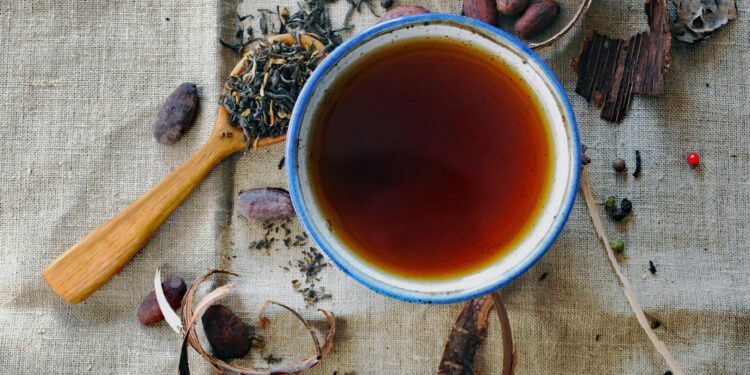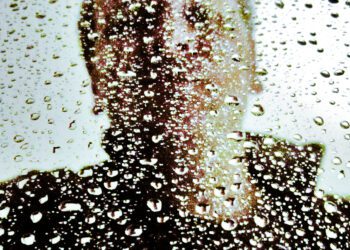Herbal tea, unlike traditional teas derived from the Camellia sinensis plant (such as black, green, or oolong tea), is an infusion made from a variety of dried flowers, fruits, herbs, and spices. This diverse composition differentiates herbal teas in both flavor profiles and health benefits.
Herbal teas encompass a wide array of popular varieties including chamomile, peppermint, rooibos, hibiscus, and ginger tea. Each type offers unique taste characteristics and potential wellness advantages.
A notable feature of herbal teas is their general lack of caffeine. As these beverages are typically crafted without true tea leaves—known for their natural caffeine content—they provide a soothing alternative to conventional caffeinated drinks such as black or green tea.
This absence of caffeine makes herbal teas an attractive choice for those seeking relaxation or wishing to avoid stimulants while still enjoying a rich tapestry of flavors and aromatic experiences.
What Constitutes Herbal Tea?
Understanding the Concept and Differentiating from Traditional Teas:
Herbal tea, distinct from traditional teas derived from Camellia sinensis such as green or black tea, is primarily composed of various herbs, flowers, fruits, or other plant materials. This exceptional variety allows for a broad spectrum of flavors and health benefits.
Popular Varieties of Herbal Teas:
Among the myriad options available in herbal teas are notable examples like chamomile, peppermint, ginger, rooibos (red bush), and hibiscus. Each type offers unique properties and flavor profiles that cater to diverse palates and wellness objectives.
Absence of Caffeine Means Unique Benefits:
A key characteristic setting herbal teas apart is their general lack of caffeine. This absence arises because these beverages do not stem from the Camellia sinensis plant—a known source of natural caffeine found in traditional teas. Consequently, individuals seeking a soothing beverage without stimulating effects often turn to herbal selections.
Contrasting with Traditional Teas:
In comparison to conventional varieties—such as black tea which contains approximately 40-70 mg of caffeine per cup or green tea with about 20-45 mg per cup—herbal teas offer an inviting alternative for those avoiding stimulant intake while still enjoying rich and varied tastes.
Frequently Asked Questions Regarding Herbal Tea:
*Impact of Herbal Teas on Fasting Regimens*
Intermittent fasting has become a popular dieting trend in recent years, with many people choosing to restrict their eating window to certain hours of the day. During fasting periods, individuals are not allowed to consume any calories, including food and beverages that contain them. However, the consumption of herbal teas during intermittent fasting periods is a topic of debate among health experts and practitioners.
Herbal teas are made from dried fruits, flowers, herbs, or spices and are often touted for their health benefits. They are typically free of calories, sugar, and caffeine, making them a popular choice for those looking to stay hydrated and curb hunger cravings during fasting periods. Some herbal teas, such as green tea, have even been shown to boost metabolism and aid in weight loss.
Proponents of intermittent fasting argue that the consumption of herbal teas is permissible during fasting periods, as long as they do not contain any added sugars or artificial sweeteners. They claim that herbal teas can help keep hunger at bay, promote relaxation, and provide a source of hydration without breaking the fast. In fact, some experts recommend drinking herbal teas as a way to enhance the fasting experience and improve overall well-being.
On the other hand, critics of consuming herbal teas during intermittent fasting periods argue that even though they may be low in calories, they can still trigger metabolic reactions in the body that break the fast. They suggest that any kind of consumption during fasting periods, even if it is calorie-free, can disrupt the metabolic benefits of fasting, such as insulin sensitivity and autophagy.
*Shelf Life and Proper Storage of Herbal Teas*
Herbal teas have been enjoyed for centuries for their soothing properties and diverse flavors. However, like any other perishable product, herbal teas have expiration timelines that must be taken into consideration to ensure maximum freshness and potency.
The expiration timeline for herbal teas can vary depending on several factors, including the type of herbs used, how the tea is stored, and whether it is loose leaf or in tea bags. Generally, herbal teas can last anywhere from 6 months to 2 years if stored properly.
To ensure the longevity of your herbal teas, it is essential to store them in a cool, dark place away from direct sunlight and moisture. Exposure to light and moisture can accelerate the deterioration of the herbs, leading to a loss of flavor and potency. Additionally, it is recommended to store herbal teas in airtight containers to prevent exposure to air, which can also degrade the quality of the tea over time.
Another important factor to consider is the type of herbs used in the herbal tea blend. Some herbs, such as chamomile and peppermint, have a shorter shelf life compared to others like rooibos and hibiscus. It is important to check the expiration date on the packaging and follow any specific storage instructions provided by the manufacturer.
When preparing herbal teas, it is best to use water that is not boiling hot, as this can destroy the delicate essential oils and beneficial compounds in the herbs. Instead, steep the tea in water that is just below boiling point for the recommended amount of time to extract the optimal flavor and health benefits.















